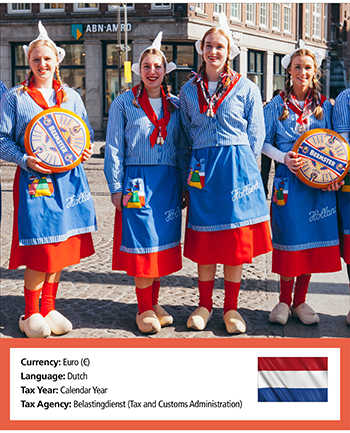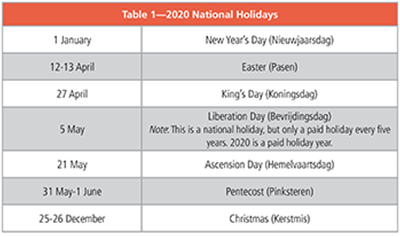 Dutch employment legislation is one of the most complex in Europe, as it changes every 12 months. For non-Dutch or foreign companies, it can be extremely challenging to track and implement these changes.
Dutch employment legislation is one of the most complex in Europe, as it changes every 12 months. For non-Dutch or foreign companies, it can be extremely challenging to track and implement these changes.
In this guide, we have included an overview of the Dutch tax system, including applicable tax rates for residents and nonresidents, as well as special expatriate tax regime and relocation allowances. The rules around rates and allowances change regularly. If an employer is found to be in breach of these regulations, it can result in huge fines or retroactive deductions, so it is important to verify with the government or an international payroll specialist.
COVID-19 Response
The Netherlands’ response to the COVID-19 pandemic has been challenging for some businesses to fully understand.
On 31 March 2020, the Dutch government announced the full terms and conditions of its Temporary Emergency Bridging Measure for Sustained Employment (NOW), which has been established to help employers through the coronavirus crisis.
The NOW provides a government subsidy of up to 90% of the employer’s wage bill for a period of three months–from March to May 2020–in order to help avoid mass redundancies and/or pay cuts as a result of the COVID-19 pandemic and the emergency lockdown in the Netherlands.
To be eligible for this support, the employer must meet three key criteria:
- Not demonstrate a drop in turnover of at least 20% against a comparable period in the last 12 months
- Continue to pay the employees’ full salary
- Not make any employees redundant during the period
The challenge for this means that a person-by-person approach cannot be applied. Employers must almost hedge their bets on the anticipated turnover reduction, while guaranteeing to meet full salary costs and face uncertainty about both the loss in turnover they incur, the funds they will receive while guaranteeing to maintain the employment of all staff, or face penalties.
Potentially this is a huge support package with up to 90% of the wage bill met by the government, but implementing the sliding scale calculation in a situation that changes by the day will no doubt present challenging decisions for employers and engagers of flexible labour.
Dutch Income Tax
Special Expatriate Tax Regime: The 30% Ruling Explained
One great benefit for expatriates in the Netherlands is the 30% tax exemption. For expats, in the current climate, the Netherlands offers certain tax incentives for those looking to bring their skill set to the country. The 30% ruling allows highly skilled migrants to pay tax on only 70% of their gross salary, which is certainly an attractive factor as, for many, finance plays a large role when it comes to relocating.
What conditions are attached to the 30% ruling? The following conditions:
- There is a lack of expertise within their field in the Netherlands
- Minimum taxable salary at 70%—€37.743
- For employees under age 30 with a master’s degree—minimum taxable salary at 70% or €28,690
- The employee and employer must agree in writing that the 30% rule conditions have been met, which can be done through the employee contract
- The employer is registered in the Netherlands, and the employee is a foreign worker
Find out more about the conditions attached to the Netherlands 30% tax regime.
How far must one live from the Netherlands to be granted the 30% ruling? The 30% provision is available solely for employees who have lived a distance of more than 150 kilometres, in a straight line, from the Dutch border for more than 16 months in the 24-month period prior to their first working day in the Netherlands. Consequently, the 30% provision is not available for employees from Belgium or Luxembourg, or for employees from Northern France, large parts of Germany, and a small part of the United Kingdom.
Social Security in the Netherlands
Employers and employees in the Netherlands are required by law to pay social security contributions in the Netherlands. These contributions are deducted automatically at the source. The level of employer contribution depends upon a variety of factors including contract type and company sector specification in the Netherlands. (There are about 100 different sectors, so classification is very important.)
The Netherlands social security contributions fall into three main categories:
- Social welfare benefits
- Employee insurance benefits
- General insurance benefits
They contribute to the below funds at varying percentages dependant on the Netherlands sector classification:
- Disability insurance
- Pension contribution
- Health insurance
- Child care
- Sickness benefit
Dutch Health Care
It is important to make sure your employees and contractors are aware that it is a government requirement that all adults living or working in the Netherlands must have basic health insurance. If an employee does not acquire health insurance, they will be at risk of a fine, which may lead to the government eventually taking payment for health insurance directly from their salary.
It is relatively easy for international workers to purchase health insurance in the Netherlands, as insurers have to offer a universal package for everyone over the age of 18 years, regardless of age or state of health—in most cases it’s illegal to refuse an application or impose special conditions, but not always.
In contrast to many other European systems, the Dutch government is responsible for the accessibility and quality of the health care system in the Netherlands, but not in charge of its management. Health care in the Netherlands is financed by a dual system that came into effect in January 2006. Long-term treatments, especially those that involve semi-permanent hospitalisation, as well as disability costs such as wheelchairs, are covered by a state-controlled mandatory insurance.
For all regular (short-term) medical treatment, there is a system of obligatory health insurance with private health insurance companies. These insurance companies are obliged to provide a package with a defined set of insured treatments. This insurance covers 41% of all health care expenses.
Premiums paid by the insured are, on average, €111 per month for basic health care (basisverzekering) with variation of about 5% between the various competing insurers, and a mandatory deductible (eigen risico) of €385 in 2018, 2019, and 2020.
International Payroll Partner
The Dutch tax and payroll process can often be complex for foreign businesses, so it is common for businesses to partner with payroll service companies such as Leap29 to manage the process on their behalf.
More information can be found in Leap29’s free “Payroll and Tax in the Netherlands Guide.”

Do you like our content? Join the GPMI community to get free education and articles straight to your inbox!

Simon Duff is Global Operations Manager for Leap29. He joined Leap29 in 2008 after graduating from Manchester University. Simon has more than 10 years of experience providing workforce management solutions to key clients across multiple sectors, including payroll, mobility support, and workforce solutions.